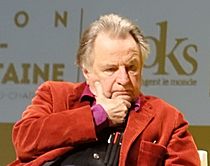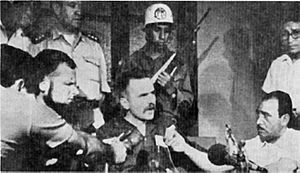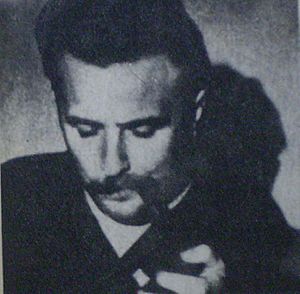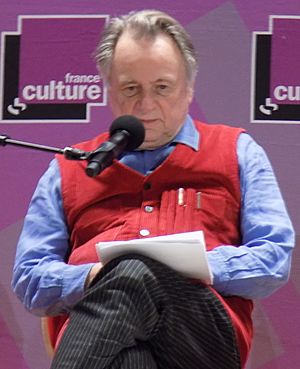Régis Debray facts for kids
Quick facts for kids
Régis Debray
|
|
|---|---|
 |
|
| Born | Jules Régis Debray 2 September 1940 Paris, France |
| Occupation | Journalist, writer, academic |
| Language | French |
| Nationality | French |
| Alma mater | École Normale Supérieure Pantheon-Sorbonne University |
| Genre | Philosophy, current events |
| Notable awards | Prix Femina Prix Décembre |
Jules Régis Debray (born September 2, 1940) is a French philosopher, journalist, and writer. He has also worked for the French government.
Debray is famous for two main reasons. First, he was a friend of the famous revolutionary leader Che Guevara. He joined Guevara in Bolivia in 1967. Second, he created an idea called "mediology," which studies how ideas and culture spread through society over time.
He also supported Salvador Allende, the president of Chile in the early 1970s. After his time in South America, he returned to France and held important jobs in the government.
Contents
Early Life and Adventures
Régis Debray was born in Paris, France. He was a very good student and studied philosophy at a top school, the École Normale Supérieure.
Working with Che Guevara
In the late 1960s, Debray moved to Cuba to teach philosophy at the University of Havana. There, he became involved with revolutionary movements and joined Che Guevara in Bolivia.
He wrote a book called Revolution in the Revolution?. This book was a guide for fighters who wanted to bring socialist ideas to Latin America. It became very popular and was published in many countries.
Prison and Release
In April 1967, Debray was arrested in the small town of Muyupampa, Bolivia. He was accused of being part of Guevara's fighting group. He was found guilty and sentenced to 30 years in prison.
Many famous people around the world, including the writer Jean-Paul Sartre and even Pope Paul VI, asked for his freedom. After three years, he was released from prison in 1970. He then went to Chile, where he interviewed President Salvador Allende and wrote a book about the changes happening there.
In 1973, a military takeover led by Augusto Pinochet happened in Chile. Debray then returned to his home country of France.
Working for the French Government
In 1981, François Mitterrand was elected president of France. Debray became one of the president's main advisers on foreign policy. He helped France build stronger relationships with other countries, especially its former colonies.
He also helped plan the big celebration for the 200th anniversary of the French Revolution. He left this government job in 1988 but continued to work in other official roles for several years.
In 1996, he wrote a book about his life called a memoir.
Later Work and Ideas
Debray has remained active in public life. He has worked on projects to improve relationships between France and other countries, like Haiti.
Defending French Values
In 2003, Debray was part of a group that studied religion in French schools. He supported a law that bans wearing obvious religious symbols in public schools. This idea is called laïcité (pronounced lah-ee-see-TAY) in French. It means the separation of church and state. The goal is to make sure all students are treated equally, no matter their religion.
Debray is also interested in the well-being of Christian communities in the Middle East.
What is Mediology?
Debray is best known for creating médiologie, or "mediology". This is the study of how culture, ideas, and messages are passed down through generations. It's not just about newspapers or TV. It looks at how things like language, art, and technology shape how we see the world.
For example, he studied how the meaning of images has changed over time. He believes that art as we know it today, made by an "artist," is a modern idea that started during the Renaissance. Before that, images were often created for religious purposes, not just for art's sake.
Personal Life
Debray was married to Elizabeth Burgos, who was from Venezuela. They have one daughter, Laurence, who was born in 1976.
See also
 In Spanish: Régis Debray para niños
In Spanish: Régis Debray para niños
 | Janet Taylor Pickett |
 | Synthia Saint James |
 | Howardena Pindell |
 | Faith Ringgold |




